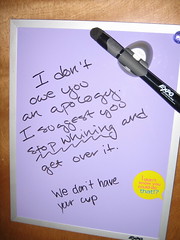 You may have heard that Tuesday night’s performance by the New York Philharmonic at Avery Fisher Hall was abruptly halted because of a stubbornly loud and persistent cell phone. The orchestra was playing the final movement of Mahler’s Ninth Symphony, considered by some to be one of the most emotionally rich and sublime pieces of music ever written. Towards the end, at the worst possible moment, the insistent plinking of the iphone “marimba” ringtone completely shattered the atmosphere. Alan Gilbert, the conductor of the Philharmonic, actually stopped the performance and glared at the offender until he managed to silence the phone. (You can read an amusing account of the evening here.)
You may have heard that Tuesday night’s performance by the New York Philharmonic at Avery Fisher Hall was abruptly halted because of a stubbornly loud and persistent cell phone. The orchestra was playing the final movement of Mahler’s Ninth Symphony, considered by some to be one of the most emotionally rich and sublime pieces of music ever written. Towards the end, at the worst possible moment, the insistent plinking of the iphone “marimba” ringtone completely shattered the atmosphere. Alan Gilbert, the conductor of the Philharmonic, actually stopped the performance and glared at the offender until he managed to silence the phone. (You can read an amusing account of the evening here.)Blog postings and news articles about the event soon filled up with vitriolic comments. What kind of a person forgets to turn off their cell phone before a concert, and then magnifies the error by failing to silence it promptly as soon as it sounds? A New York Times article answered that question the next day. The owner of the phone, far from being a thoughtless person who didn’t appreciate music, was a longtime subscriber to the orchestra and was absolutely mortified by what happened. And there was an explanation: The phone was new and he had indeed turned it off before the concert; but he hadn’t realized either that the phone’s alarm was set or that it would go off even though the phone was set to “silent.”
There is something to be learned here beyond the obvious lesson of “be familiar with all of the noise-making features of any device you carry.” The day after the concert, an orchestra official called the owner of the cell phone (following the NYT, I’ll call him “Patron X”) and politely asked him not to do it again. Patron X asked if he could be put in touch with Alan Gilbert, in order to apologize to the conductor personally. Patron X, through a NYT reporter, also apologized to the whole audience. Here is what he said:
“It was just awful to have any role in something like that, that is so disturbing and disrespectful not only to the conductor but to all the musicians and not least to the audience, which was so into this concert,” he said by telephone.Patron X’s apology hits all the right notes. Here’s why:
“I hope the people at that performance and members of the orchestra can certainly forgive me for this whole event. I apologize to the whole audience.”
- He accepts responsibility. There is a world of difference between “I’m sorry that I disturbed you” and “I’m sorry that you felt disturbed.”
- He does not try to justify his actions. In making an apology, one must absolutely avoid the phrase, “I’m sorry, but…”
- He acknowledges the harm he has caused. He does not try to minimize what happened.
- He apologizes to everyone effected – the conductor, the musicians, and the audience.
- His apology is sincere. He is genuinely upset about what happened and really contrite. An insincere apology can damage a relationship more than the absence of an apology.
- The apology is well-timed. Patron X sought out the opportunity to apologize and did so at the earliest possible opportunity.
Happily, the NYT reports that Mr. Gilbert accepted the apology.
No comments:
Post a Comment